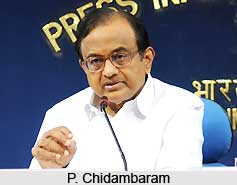 Ministry of Finance looks after the monetary aspects of Governance. Following independence, the finance department was given the new name of Ministry of finance. This ministry was organised into three major wings- expenditure, economic affairs and revenue. Over the years following its formulation, this ministry has witnessed a number of changes. In the year 1979, the ministry was organised into four departments of expenditure, economic affairs, revenue and insurance and banking, with each department being in charge of a Secretary of Government. In the year 1985, once again the Ministry was organised into three departments, the department of banking having been merged with the department of economic affairs as a separate division. Finally, in 1991, the Department was so organised that it comprised a total of three Departments, namely, Economic Affairs, Expenditure and Revenue.
Ministry of Finance looks after the monetary aspects of Governance. Following independence, the finance department was given the new name of Ministry of finance. This ministry was organised into three major wings- expenditure, economic affairs and revenue. Over the years following its formulation, this ministry has witnessed a number of changes. In the year 1979, the ministry was organised into four departments of expenditure, economic affairs, revenue and insurance and banking, with each department being in charge of a Secretary of Government. In the year 1985, once again the Ministry was organised into three departments, the department of banking having been merged with the department of economic affairs as a separate division. Finally, in 1991, the Department was so organised that it comprised a total of three Departments, namely, Economic Affairs, Expenditure and Revenue.
Department of Economic Affairs
This department is the nodal agency of the Union Government to formulate and monitor the country`s economic policies and programmes having a bearing on domestic and international aspects of economic management. A principal responsibility of this Department is the preparation of the Union Budget annually. This is exclusive of the Railway Budget.
Department of Expenditure
The Department of Expenditure is the nodal Department for overseeing the public financial management system in the Central Government and matters connected with State finances. The principal activities of the Department include pre-sanction appraisal of major schemes/projects (both Plan and non-Plan expenditure), handling the bulk of the Central budgetary resources transferred to States, implementation of the recommendations of the Finance and Central Pay Commissions, overseeing the expenditure management in the Central Ministries/Departments through the interface with the Financial Advisors and the administration of the Financial Rules / Regulations / Orders through monitoring of Audit comments/observations, preparation of Central Government Accounts, managing the financial aspects of personnel management in the Central Government, assisting Central Ministries/Departments in controlling the costs and prices of public services, assisting organizational re-engineering through review of staffing patterns and reviewing systems and procedures to optimize outputs and outcomes of public expenditure. The Department has under its administrative control the National Institute of Financial Management (NIFM), Faridabad. The business allocated to the Department of Expenditure is carried out through its Establishment Division, Plan Finance- I and II Divisions, Finance Commission Division, Staff Inspection Unit, Cost Accounts Branch, Controller General of Accounts and the Central Pension Accounting office
Department of Revenue
The Department of Revenue functions under the overall direction and control of the Secretary for Revenue. It exercises control in respect of matters relating to all the Direct and Indirect Union Taxes through two statutory Boards namely, the Central Board of Direct Taxes (CBDT) and the Central Board of Excise and Customs (CBEC). Each Board is headed by a Chairman who is also ex-officio Special Secretary to the Government of India. Matters relating to the levy and collection of all Direct taxes are looked after by the CBDT whereas those relating to levy and collection of Customs and Central Excise duties and other Indirect taxes fall within the purview of the CBEC. The two Boards were constituted under the Central Board of Revenue Act, 1963. At present, the CBDT has six Members and the CBEC has five Members. The Members are also ex-officio Additional Secretaries to the Government of India.
The Ministry of Finance has a Cabinet Minister who is assisted by two ministers of state. The administrative head of the Ministry is the Finance Secretary and there is a full-fledged secretary in charge of each Department, assisted by additional secretaries, directors, under secretaries and secretarial staff under them.




















